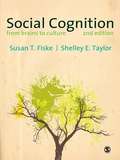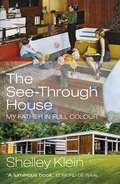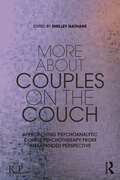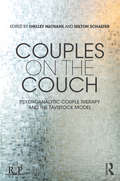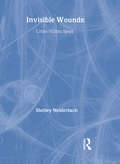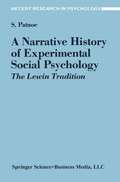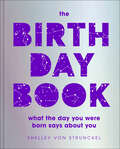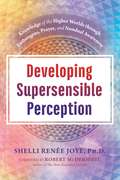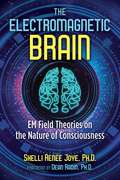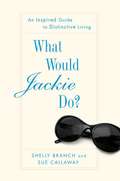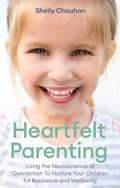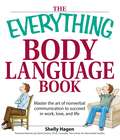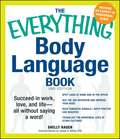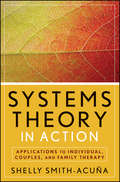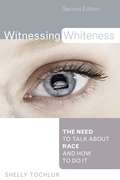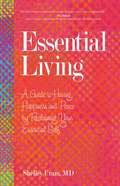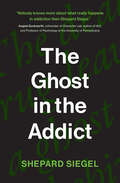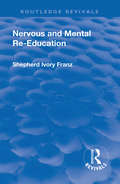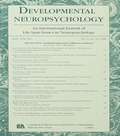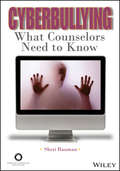- Table View
- List View
Social Cognition
by Shelley Kathleen Taylor Susan FiskeIn Social Cognition: From Brains to Culture 2nd Edition, Fiske and Taylor carefully integrate the many new threads of social cognition research that have emerged in the intervening years since the previous edition, including developments within social neuroscience, cultural psychology and some areas of applied psychology, and continue to tell a powerful and comprehensive story about what social cognition is and why it's a significant phenomenon in society today. Every updated chapter now includes more figures and tables, glossary entries, and further readings. A supplemental test bank including some full-text journal articles corresponding to chapters in the book is available online at: www.sagepub.co.uk/fiskeandtaylor.<P><P> This textbook will be indispensable to students of social cognition and social psychology worldwide, at undergraduate or graduate level. <P> Visit the Companion Website at www.sagepub.co.uk/fiskeandtaylor
The See-Through House: My Father in Full Colour
by Shelley Klein'A charming account of a daughter, a house and a fastidious dad' Sunday TimesShelley Klein grew up in the Scottish Borders, in a house designed on a modernist open-plan grid. With colourful glass panels set against a forest of trees, it was like living in a work of art. Her father, Bernat Klein, was a textile designer whose pioneering colours and textures were a major contribution to 1960s and 70s style.Thirty years on, Shelley moves back home to care for her father, now in his eighties: the house has not changed and neither has his uncompromising vision - or his distinctive way of looking at the world. Told with great tenderness and humour, this is Shelley's account of looking after an adored yet maddening parent and a piercing portrait of the grief that followed his death. 'A sad, funny, utterly fascinating book about families, home and how to say goodbye' Mark Haddon'Original, moving and bracingly honest... often hilarious' Blake Morrison, Guardian'It is strange that grief should produce such a life-affirming book, but it has. Read it for the solace it contains, or for its captivating descriptions. Either way, it's a delight' Telegraph
Identity, Segregation and Peace-Building in Northern Ireland: A Social Psychological Perspective
by Shelley MckeownHaving experienced over 30 years of violent conflict, Northern Ireland acts as an interesting case study in which to examine the causes and consequences of political violence. At the same time this society provides a number of important peace-building lessons for other conflicted societies across the globe. Whilst there are a plethora of books examining the Northern Ireland 'problem', Identity, segregation and peace-building in Northern Ireland stands out from the crowd as being succinct and offering a unique social psychological perspective. It provides an overview of some of the key issues relating to the conflict and its maintenance along with a list of further recommended reading for those interested in delving further. This is an accessible book for anyone interested in understanding more about the conflict in Northern Ireland, or for those who are interested in conflict, identity and peace-building more generally.
More About Couples on the Couch: Approaching Psychoanalytic Couple Psychotherapy from an Expanded Perspective (Relational Perspectives Book Series)
by Shelley NathansFollowing the critically acclaimed Couples on the Couch, this volume offers further compelling ideas about couple psychotherapy from a psychoanalytic perspective. The book well represents the foundational basis of the Tavistock model and draws deeply from the work of Freud, Klein, Bion, Meltzer and the contemporary Kleinians, while expanding the theoretical model by featuring ideas about couple relationships written from a variety of psychoanalytic frameworks. These additional frameworks include Winnicottian Theory, Fairbairn’s Object Relations Theory, Link Theory, Self Psychology, Attachment Theory, Mentalization Theory, and Contemporary Relational Theory. This rich array of theoretical models, presented with exemplifying clinical material, results in a diverse assembly of papers that offer the reader an in-depth and complex view of a psychoanalytic approach to understanding and working with the dynamics of couple relationships. With clear clinical guidance, this book will be invaluable for all psychoanalysts and psychotherapists working with couples.
Couples on the Couch: Psychoanalytic Couple Psychotherapy and the Tavistock Model (Relational Perspectives Book Series)
by Shelley Nathans and Milton SchaeferCouples on the Couch provides a clear guide to applying the Tavistock model of couple psychotherapy in clinical psychoanalytic practice, offering a compelling sampling of ideas about couple relationships and couple psychotherapy from a broadly relational psychoanalytic perspective. The book provides an in-depth perspective to understanding intimate relationships and the complexities of working in this domain.The chapters and their accompanying discussion also offer a fertile resource of material for readers who have not previously had exposure to the theory and technique of psychoanalytic psychotherapy, as well as offering an expanded and more rigorous approach to those who are already familiar with the Tavistock model. The chapters cover key topics including: unconscious beliefs, forms of couple relating, sex and aging and draw upon the work of Klein, Winnicott and Bion, as well as attachment and object relations theory. The majority of the contributors are affiliated with the Tavistock Centre for Couple Relations (TCCR) in London or The Psychoanalytic Couple Psychotherapy Group in Berkeley, California and make fundamental use of the theoretical model that has been developed at TCCR since the 1940's. Couples on the Couch provides an introduction to the TCCR approach to couple psychotherapy and exposure to the depth and breadth of this framework. Each of the chapters contain in-depth theoretical and clinical case material, presented in tandem with formal discussion, demonstrating how theory may be applied in a variety of clinical encounters and by doing so, deepening the theoretical understanding of the difficulties that beset couples and the challenges posed to those who work with them. The book provides an in-depth perspective to understanding intimate relationships and the complexities of working in this domain. Couples on the Couch will be of great interest to couple psychotherapists and counselors, marriage and family therapists, psychoanalysts, as well as graduate and postgraduate students in psychology, marriage and family therapy, or those in psychoanalytic training programs.
Invisible Wounds: Crime Victims Speak
by Shelley Neiderbach Susan IwansowskiFeel the terror and anger experienced by crime victims as you read accounts of the highly charged therapy sessions at New York City’s Crime Victims’Counseling Services, the first group therapy services for crime victims of its kind. This emotionally charged book contains actual transcripts of interviews with crime victims as they explain the violations against them--their recollections of the assault itself and their feelings afterward. Their stories provide insights into the acute and profound trauma that crime victimization evokes. The helping and healing processes are a catharsis for the victim--and powerful reading for the rest of us.
A Narrative History of Experimental Social Psychology: The Lewin Tradition (Recent Research in Psychology)
by Shelley PatnoeA Narrative History of Experimental Social Psychology presents lengthy and intensive interviews with the contemporary scientists that founded and shaped the field of social psychology. The story of social psychology is told through the autobiographical narratives of leading figures, such as Dorwin Cartwright, Harold Kelley, Kurt Back, Robert Krauss, Stanley Schachter, and Leon Festinger. The author traces the beginning of the field from the close-knit group of students around Kurt Lewin to the major research groups responsible for the scientific origins of the discipline. The interviews offer unique insights into the beginnings of the fields and prospects for future trends.
Health Psychology
by Shelley TaylorSince the first edition was published in 1986, Health Psychology has helped thousands of college students learn how to maintain their health and guard against illness. The goal of this book has always been to make research accessible in a way that integrates theory with practical applications so that people can lead healthier lives. The importance of social relationships, health behaviors, and co-management of health and illness are themes that are woven throughout the text. The Connect course for this offering includes SmartBook, an adaptive reading and study experience which guides students to master, recall, and apply key concepts while providing automatically-graded assessments.
The Birthday Book: What the day you were born says about you
by Shelley von StrunckelFind out what your birthday says about you and what your friends' birthdays say about them in this utterly compelling gift book.What makes me me? Who am I most compatible with? How will my future turn out? Shelley von Strunckel is an expert at answering all these questions and more for her celebrity clients and in her newspaper columns.Use your birthday to identify key personality traits and entertain friends and family by revealing theirs. Harnessing the power of astrology in an entertaining and informative way, you'll learn about the dates, numbers, colors, and even foods with which each person is most compatible.With descriptions of every birth day of the year, The Birthday Book is written in an easy-to-understand style, beautifully illustrated, and packed with information. It is an at-a-glance reference guide to astrology, numerology, and tarot that will entertain you, your friends and family for years to come.
Developing Supersensible Perception: Knowledge of the Higher Worlds through Entheogens, Prayer, and Nondual Awareness
by Shelli Renée JoyeA detailed guide to awakening your powers of supersensory perception • Details methods and techniques for the acquisition of supersensory powers distilled from Rudolf Steiner’s 400 published volumes and from Patañjali’s Yoga Sutra • Explores acquisition of these powers at birth (genetic) and through entheogens, mantra and prayer, effort and exercise, and nondual meditation • Includes a map of consciousness based on the work of neuroscientist Karl Pribram and physicist David Bohm According to philosopher Rudolf Steiner (1861-1925), there exists within every human being the potential for developing supersensory powers and, with these powers activated, the ability to awaken the higher self and attain knowledge of non-physical higher worlds. Steiner himself worked diligently throughout his life to develop his faculties of “supersensible perception” and, scattered throughout his many works, he describes methods by which to activate and operate these supersensory-cognitive systems. Distilling techniques from Steiner’s more than 400 published volumes, Shelli Renée Joye, Ph.D., presents a practical, modern approach to acquiring, cultivating, and maintaining supersensible perception and developing higher consciousness. The five approaches she studies include acquisition by birth (genetic), entheogens, mantra and prayer, effort and exercise, and Samadhi--equated by many with nondual awareness. Adding another dimension to Steiner’s methods, the author shows how these steps are powerfully aligned with 4th-century South Indian sage Patañjali’s teachings in the Yoga Sutra. The author explores how to develop what you have acquired through imaginative, active, or intuitive thinking, as well as how to learn through inner guidance and how to transform knowledge gained from books into spiritual advancement. She also shares her own extraordinary experiences of supersensory networks of consciousness. Connecting Steiner’s ideas to modern advances in quantum physics, psychedelic science, and consciousness studies, Dr. Joye shows how each of us is capable of developing supersensible perception and expanding our awareness to connect with cosmic consciousness.
Tantric Psychophysics: A Structural Map of Altered States and the Dynamics of Consciousness
by Shelli Renée Joye• Explores how esoteric teachings from India and Tibet offer specific methods for tuning and directing consciousness to reach higher stages of awareness • Presents a wide-ranging collection of practical techniques, as well as numerous figures and diagrams, to facilitate navigation of altered states of consciousness and heightened mystical states • Develops an integrated structural map of higher consciousness by viewing Tibetan and Indian Tantra through the work of Steiner, Gurdjieff, Teilhard de Chardin, Aurobindo Ghose, and quantum physicists Planck and Bohm Throughout the millennia shamans, saints, and yogis have discovered how the brain-mind can be reprogrammed to become a powerful instrument facilitating access to higher states of consciousness. In particular, the written Tantric texts of India and Tibet describe, in extraordinarily precise detail, interior transformations of conscious energy along with numerous techniques for stimulating, modulating, and transforming consciousness to reach increasingly higher states and stages of awareness. In this in-depth examination of esoteric Tantric practices, Shelli Renée Joye, Ph.D., presents a wide-ranging collection of psychophysical techniques integrating Tibetan Vajrayana and Patanjali&’s Yoga to induce altered states of consciousness for the exploration of heightened mystical states. Sharing numerous figures and diagrams, she shows how these theories and techniques are not only fully supported by modern biophysics, brain science, and quantum physics but are also in line with the work of Rudolf Steiner, G. I. Gurdjieff, Pierre Teilhard de Chardin, Aurobindo Ghose, Max Planck, and David Bohm. The author also shares insights from her own personal practices for consciousness exploration, which include prayer, mantra, emptying the mind, psychedelics, yoga, and visualization of interior physiology. Offering a structural map of the dynamics of consciousness, Joye reveals that one can develop new ways of tuning and directing consciousness to reach extraordinary modes of being and intense levels of lucid awareness, the requisites for the direct exploration of supersensible dimensions and sailing in the ocean of consciousness.
The Electromagnetic Brain: EM Field Theories on the Nature of Consciousness
by Shelli Renée JoyeAn exploration of cutting-edge theories on the electromagnetic basis of consciousness • Details, in nontechnical terms, 12 credible theories, each published by prominent professionals with extensive scientific credentials, that describe how electromagnetic fields may be the basis for consciousness • Examines practical applications of electromagnetic-consciousness theory, including the use of contemporary brain stimulation devices to modify and enhance consciousness • Explores the work of William Köhler, Susan Pockett, Johnjoe McFadden, Rupert Sheldrake, Ervin Laszlo, William Tiller, Harold Saxton Burr, Sir Roger Penrose, Stuart Hameroff, Mari Jibu, Kunio Yasue, Karl Pribram, Alfred North Whitehead, and James Clerk Maxwell, as well as the author's own theories In this scientific exploration of the origin of consciousness, Shelli Renée Joye, Ph.D., explores 12 credible theories, each published by prominent professionals with extensive scientific credentials, that describe how electricity in the form of electromagnetic fields is the living consciousness that runs through the brain. Each of these theories supports the idea that the electromagnetic field itself is the basis of consciousness and that this source of consciousness peers out into the space-time universe through our human sensory systems, flowing with awareness throughout the bloodstream and nervous system. Following her exploration of electromagnetic-consciousness theories, Joye then examines practical applications, describing how electric fields might be manipulated and controlled to modify and enhance the operation of consciousness in the human brain. She explores the use of contemporary brain stimulation devices that offer benefits such as decreased addiction cravings and anxiety, reduced depression and chronic pain, enhanced mathematical abilities, accelerated learning, and greater insight during mindfulness meditation. Revealing the cutting edge of consciousness studies, Joye shows that consciousness is not an isolated function of the individual brain but is connected to the larger electromagnetic field that not only encompasses the entire physical universe but also is deeply involved in the creation of matter and the material world.
What Would Jackie Do? An Inspired Guide to Distinctive Living
by Shelly Branch Sue CallawayFrom fashion to finance, a sophisticated and entertaining guide that shows readers how to attain the elegance and practical smarts that defined Jackie O. We can't help but want to be like her: Exuding unmatched poise and style, she continues to fascinate people of all ages. But how would Jackie have handled the twenty-first-century? What would she think about a society that celebrates out-sized egos, instant everything, and casual rules of conduct? How might she dress for the office, scan for a man, accessorize a home, and get away from it all when necessary? With intriguing research, commentary from today's experts, and fond reminiscences from those who knew and admired the first lady of perfection, journalists Shelly Branch and Sue Callaway now offer a sparkling answer to the question, What Would Jackie Do? Applying Jackie's philosophies to every aspect of contemporary life, including relationships, office politics, family matters, and entertaining, What Would Jackie Do?is a trove of advice, featuring: "Noblesse Oblige for Beginners" How Not to be an Interchangeable Woman -- Mastering the Effortless Rich look -- The art of attachment: lessons on sex, marriage, and men of consequence -- Career Whirl: Pearls for Getting Ahead -- Caftan in a Kelly bag: How to travel beautifully -- Behave! Anti-brat strategies for parents -- En Suite Home: Perfecting Your Domestic Pitch -- The next best thing to having Jackie O. as a personal adviser, What Would Jackie Do? reveals the practical wisdom behind an icon and gives all readers a piece of the Jackie mystique, be it of the heart, the mind, or the home.
Heartfelt Parenting: Using the Neuroscience of Connection To Nurture Your Children for Resilience and Wellbeing
by Shelly ChauhanDrawing on current powerful neuroscience, this book equips you with a deep insight into how your interconnected brain, mind and body shapes your capacity for heartfelt connection, emotional regulation and compassion, and the compelling influence this has on your child's developing mind.We know, based on established brain science, that children develop well in the care of parents who can regulate and express their own emotions effectively, who are present and attentive rather than in 'autopilot' mode, and who show warmth, empathy and compassion along with the requisite level of authority towards them. But in this day and age of relentless mental overload, busy schedules and constant stimulation, many parents know how difficult it can be to exude the sense of openness, warmth and connection that children need to develop well. The last thing parents need is yet more prescriptive advice about what you should and shouldn't think, do or say as a parent, so this this book helps you understand, in a tangible way, how to feel relaxed, open and compassionate when you are around your children. This is a vital ingredient in parenting, because this feeling state, involving your brain, nervous system, heart, facial expressions and voice, deeply calms your children, enables them to listen to you and respect your rules, and nourishes their brains for life-long resilience, empathy, self-acceptance and authenticity. Shelly Chauhan's approach removes some of the stress and complexity that parenting seems to involve these days and turns it into the intuitive, natural and enjoyable process it is able to be.
The Everything Body Language Book: Decipher signals, see the signs and read people's emotions—without a word! (Everything® Series)
by Shelly HagenShifty eyes? Your boss is lying. Wide, open eyes? Your blind date is definitely interested. Crossed arms? Your mother-in-law is feeling defensive.You can read anyone's body language-if you know how and where to look. Master the art of nonverbal communication and you'll unlock the secrets of everyone you meet-yourself included!Learn how to:Identify an aggressive handshakeRecognize a genuine smileDisplay self confidenceTell when your child is fibbingShow your date you're interested When you can interpret body language, you're literally clued in to the world around you-and everyone in it. Whether you're at work, at home, or even on a blind date, The Everything Body Language Book is your ticket to understanding people-one wink, blink, and nod at a time!
The Everything Body Language Book: Succeed in work, love, and life - all without saying a word!
by Shelly HagenIs my daughter telling me the truth about where she was last night? How can I show my boss that I am ready for a promotion? I think that girl likes me, but I'm not sure.Crossed arms. Eye contact. Fidgeting. These are all the body's subtle ways of speaking, and they can tell you more than you think. With over half of human communication coming from movement, you need a comprehensive guide to reading and understanding body language. This updated edition features an expanded section on discovering deception and foolproof ways to spot a liar.With this guide, you'll learn valuable nonverbal nuances, including how to:Project professional body language at workDetect a liar at home, school, or in a relationshipTell if your date is into you--or planning to leave youRecognize and control hostile body language you may projectDecipher digital and online body language From dating to job interviews to finding out if your kid really did eat his veggies, this is the ultimate guide to master the art of nonverbal communication!
Spirit and Trauma: A Theology of Remaining
by Shelly RamboThe author draws on contemporary studies in trauma to rethink a central claim of the Christian faith: that new life arises from death. Reexamining the narrative of the death and resurrection of Jesus from the middle day-liturgically named as Holy Saturday-she seeks a theology that addresses the experience of living in the aftermath of trauma. Through a reinterpretation of "remaining" in the Johannine Gospel, she proposes a new theology of the Spirit that challenges traditional conceptions of redemption. Offered, in its place, is a vision of the Spirit's witness from within the depths of human suffering to the persistence of divine love.
Systems Theory in Action
by Shelly Smith-Acuña"Smith-Acuña illuminates the structural hierarchy, roles, and boundaries that give a system structure. The relationship between parts and wholes is both simple and profound, and particularly important in looking at systems structure. These morsels of wisdom are good examples of Smith-Acuña's grace as a systems theory tour guide: one moment she's digging deeper into the nuances among the theories, the next moment she's simplifying without dumbing down, but in a manner that is enormously liberating. We enjoy the fun, full, and informed journey with her." -Frank S. Pittman III, MDA practical presentation of systems theory as a fundamental model for clinical practiceValuable for seasoned mental health professionals as well as those in training, Systems Theory in Action presents systems theory-the unifying principles surrounding the organization and functioning of systems-as it applies to individual, couples, and family therapy.This innovative book explores systems theory as an effective model for general mental health practice. It examines the role systems theory can play, specifically in understanding clients' presenting problems in context, within the various systems and subsystems in which the problems are embedded.Filled with realistic clinical stories illustrating relevant concepts that tie theory to technique, Systems Theory in Action takes an in-depth look at: Systems theory as a solid guide through the dynamic process of psychotherapy The multilayered value of observing human interactions through a systems view Systemic thinking, its core components, and how it serves to reveal a "big picture" view of clients and their presenting problemsSystems Theory in Action is a unique contribution to the field, translating the technical terminology of general systems thinking into common, everyday language.
Witnessing Whiteness: The Need to Talk About Race and How to Do It (Second Edition)
by Shelly TochlukWitnessing Whiteness invites readers to consider what it means to be white, describes and critiques strategies used to avoid race issues, and identifies the detrimental effect of avoiding race on cross-race collaborations. The author illustrates how racial discomfort leads white people toward poor relationships with people of color. Questioning the implications our history has for personal lives and social institutions, the book considers political, economic, socio-cultural, and legal histories that shaped the meanings associated with whiteness. Drawing on dialogue with well-known figures within education, race, and multicultural work, the book offers intimate, personal stories of cross-race friendships that address both how a deep understanding of whiteness supports cross-race collaboration and the long-term nature of the work of excising racism from the deep psyche. Concluding chapters offer practical information on building knowledge, skills, capacities, and communities that support anti-racism practices, a hopeful look at our collective future, and a discussion of how to create a culture of witnesses who support allies for social and racial justice.
Essential Living: A Guide to Having Happiness and Peace by Reclaiming Your Essential Self
by Shelly UramMost of us think that the key to happiness and fulfillment is having more money, greater career success, or a loving relationship or family. Yet even when we achieve these goals, we ultimately still find ourselves not fully satisfied or happy, and in an endless cycle of wanting more or something different. Why is this? As noted psychiatrist Dr. Shelley Uram shows us, when we peel back the layers to reveal what we really want most in life, it turns out to be the qualities that are already present at our very core—our Essential Self. They include peace, joy, love, a sense of freedom, and a sense of connectedness. However, until we reconnect with our Essential Self, most people do not remember who they are at their very core.In Essential Living, Dr. Uram explains how our ancient survival brain mechanisms shortcircuit our connection to our Essential Self, starting when we are young children, which ultimately leads us away from who we really are and down a path of unnecessary suffering. She then provides readers with self-assessment exercises, frameworks, and tools to chart a personalized return to the Essential Self. By learning how to quiet the ancient survival brain and reclaim our essence, we can discover an unlimited wellspring of what will truly sustain and fulfill us.
The Ghost in the Addict
by Shepard SiegelHow withdrawal distress and cravings can haunt current and former addicts, and what they can teach us about addiction and its treatments.&“The dead drug leaves a ghost behind. At certain hours it haunts the house,&” Jean Cocteau once wrote. In The Ghost in the Addict, Shepard Siegel offers a Pavlovian analysis of drug use. Chronic drug use, he explains, conditions users to have an anticipatory homeostatic correction, which protects the addict from overdose. This drug-preparatory response, elicited by drug-paired cues, is often mislabeled a &“withdrawal response.&” The withdrawal response, however, is not due to the baneful effects of previous drug administrations; rather, it is due to the body&’s preparation for the next drug administration—a preparatory response that can haunt addicts like a ghost long after they have conquered their usage.Examining the failure of legislation, the circumstances of overdose, and the cues that promote drug use, Siegel seeks to counter the widespread belief that addiction is evidence of a pathology. Instead, he proposes that the addict has an adaptive, learned response to the physiological changes wrought by drug use. It is only through understanding so-called withdrawal symptoms as a Pavlovian response, he explains, that we can begin to understand why addicts experience cravings long after their last drug use.
Revival: Nervous and Mental Re-Education (Routledge Revivals)
by Shepherd Ivory FranzThe problems of readjustment, for the individual and for the business purse and for the state, which inevitably follow war are most important at the present moment. Almost five years after the end of the Great Conflict, many of these problems are still facing us, and it will take many more years before they are settled. One who is interested in the statistics of conditions will find many places in which they can be found. Although statistics show what exists or has existed, they seldom provide advice regarding the solutions. The present work is entirely lacking in statistics It is intended to be of assistance in the solution of some problems.
EveryBody's Different on EveryBody Street
by Sheree FitchThe award-winning poet and author of Summer Feet offers delightful rhyming picture book that helps children embrace diversity. If ever you go travellingOn EveryBody StreetYou'll see EveryBody&’s DifferentThan EveryOne you meet Sheree Fitch&’s playful words lead you into this beautiful children's book and invite you to celebrate our gifts, our weaknesses, our differences, and our sameness. Fitch displays her wit and mastery of words in quick, rollicking rhymes that are complemented by Emma FitzGerald&’s lively illustrations. EveryBody&’s Different on EveryBody Street was originally produced in 2001 as a fundraiser to commemorate the 10th Anniversary of the Festival of Trees in support of the Nova Scotia Hospital and to raise awareness for mental illness and addiction. &“With a style reminiscent of Quentin Blake, FitzGerald&’s illustrations of people letting their freak flag fly complement Fitch&’s exuberant, playful, and poignant rhymes.&” ―Quill & Quire (Toronto, ON) &“Fitch&’s lyrical prose is enhanced by the very beautiful illustrations of Emma FitzGerald. The illustrations are done in bold and bright colors, and are very rich in detail which provides a superb backdrop for this poem about individual differences.&” ―Canadian Materials Magazine
Gonadal Hormones and Sex Differences in Behavior: A Special Issue of developmental Neuropsychology
by Sheri A. BerenbaumAs the papers in this special issue demonstrate, gonadal hormones have powerful effects on the development of the brain and behavior in human beings, as in other species. Both androgens and estrogens affect behavior throughout development, from early prenatal life through adulthood, as demonstrated in studies with a variety of methods in several species. The articles also describe attempts to identify the mechanisms--neural and basic behavioral--that mediate hormonal effects on complex human behaviors. This issue testifies to the breadth and vitality of research into the ways that hormones affect the development of sex-typical behavior, and illustrates several important themes that have emerged in human psychoneuroendocrinology. First, it is now clear that hormones do affect human behavior, and the important questions relate to the mechanisms and details of hormone action. Second, there are many ways to study hormone effects on human behavior, and this issue describes these methods and their products. Third, traditional conceptions of hormone-behavior relations have generally stood the test of time, but recent developments have begun to reveal the complexity of these relations. Taken as a whole, the articles in this special issue are interesting and worthwhile reading in their own right, but they may also act to stimulate developmental neuropsychologists to consider hormones in their own studies.
Cyberbullying: What Counselors Need to Know (Routledge Monographs In Mental Health Ser.)
by Sheri BaumanThis informative book offers complete, up-to-date coverage of the growing problem of cyberbullying. Written for counselors, teachers, school leaders, and others who work with children and teens, Cyberbullying addresses the real-life dangers students face on the Internet. Benefits and Features Discussion of the different types of cyberbullying and cyberbullying environments Overview of prominent theories of aggressive behavior Examination of the developmental differences in cyberbullying and victimization across the life span Proactive responses to cyberbullying Effective, nonpunitive strategies for responding to cyberbullying Useful information for parents on current technology and popular websites Guidance on the role of counselors in prevention, intervention, and advocacy Practical tips to identify and follow cyberfootprints Chapter on adult cyberbullying List of helpful websites, books, and media Appendix with review of the latest cyberbullying research *Requests for digital versions from the ACA can be found on wiley.com. *To request print copies, please visit the ACA website here: http://isgweb.counseling.org/ISGweb/Purchase/ProductDetail.aspx?Product_code=72900 *Reproduction requests for material from books published by ACA should be directed to permissions@counseling.org
